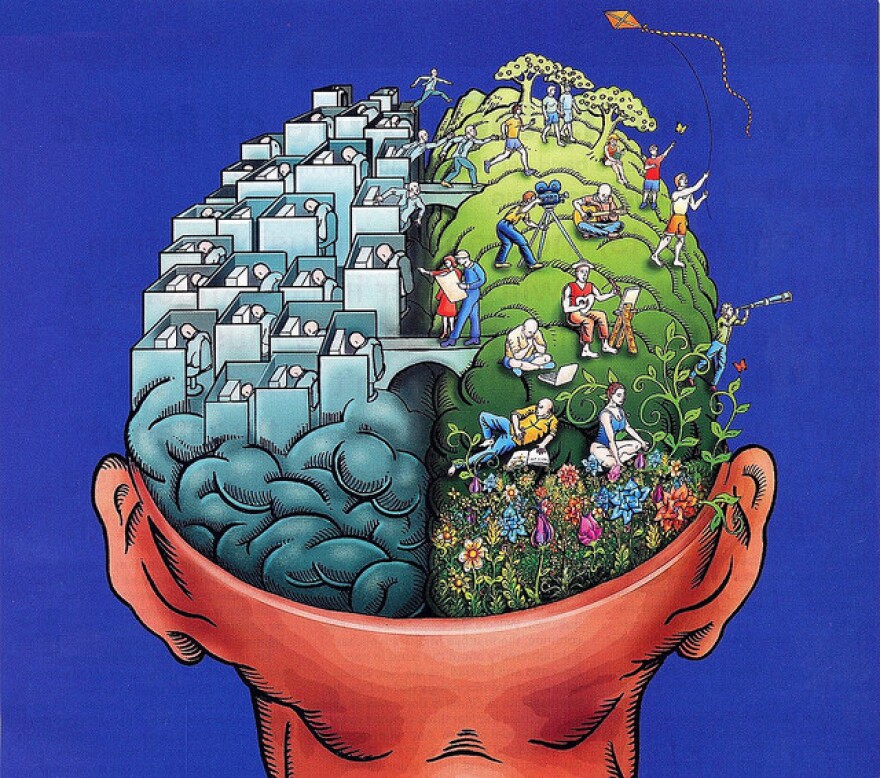Organizational theorist Richard Boyatzis was recently named one of the world’s most influential thinkers in human resources management.
But Boytzis does not think of employees as "resources." He says they’re people, and effective managers treat them that way.
In this week’s Exploradio, WKSU’s Jeff St.Clair sat down with Boyatzis to learn how a manager’s way of thinking can either motivate people or shut them down.
Case Western Reserve University professor Richard Boyatzis doesn’t mince words about his research findings.
“You show me a leader or a manager who opens their meeting with financials and I’ll show you an ineffective leader. Period.” - Richard Boyatzis
Boyatzis was one of the first researchers to measure ‘emotional intelligence’ -- the people skills beyond standard intelligence that make for effective leaders.
“I understand that the financials are important, but they’re not the purpose of what we’re doing. And when you want to engage people, you want to engage the whole person. You want not just their minds, you want their hearts and minds.”
Boyatzis acknowledges that the idea of "heart" and "mind" is mostly poetic. He says, it’s all in the brain, but experienced through different neural pathways.
“When you coach someone, or advise them, or you talk to them about their dreams or their core values, or their compassion or who they’re grateful to," he says, "you actually activate networks in the brains that facilitate a person being more open to new ideas. And that’s when I think people are willing to learn or explore something new.”
Dueling neural pathways dominate thinking
Boyatzis found that when managers ask people to envision a positive future, it engages the nervous system in a way that makes them intellectually and emotionally open to change. He also found that when people focus on obstacles and challenges -- the negatives --they shut down.

Boyatzis has teamed with Case neuroscientist Anthony Jack to see exactly how this works inside people’s brains, using MRI scans.
Jack says we use two separate neural pathways when relating with people, or dealing with things.
“There’s an opposition between really connecting with someone, understanding someone in that interpersonal way, versus understanding how a machine works,” according to Jack.
Treating employees like objects
But Jack says some managers get stuck in the mode of thinking called the Task-Positive Network that leads them to treat people like objects.
“So it’s really interesting that we use those phrases 'calculating' and 'manipulative' to refer to anti-social interaction," according to Jack. He says the reason is that, "we use exactly the same brain areas that we use to manipulate objects with our hands.”
Conversely, the neural pathway that makes people open to new ideas through positive visioning is the same circuitry that helps managers connect with people. This relationship-building way of thinking is known in scientific circles as the Default-Mode-Network.
Boyatzis says our brain machinery can only engage one of these neural networks at a time.
The Task-Positive Network gets a lot of overemphasis in our society, and the Default-Mode Network, which is key to being open to new ideas and others and moral concerns, occasionally gets short shrift.”
Finding the balance between Task-Positive and Default modes
"You show me a leader or a manager who opens their meeting with financials and I'll show you an ineffective leader. Period." - Richard Boyatzis
Boyatzis says there are risks for groups whose leaders spend too much time in the Task-Positive Mode because it de-emphasizes ethical considerations.
“It has a consequence that it blocks you from being open to new ideas or other people or moral concerns of what’s fair and just.”
But, he says the opposite is also true. Too much soul-searching can cause a manager to wander. The best leaders, he says, have the ability to balance cognitive and emotional intelligence.
“So this notion of balance helps us both say why -- when in MBA programs you study accounting, and finance, and statistics, and economics and all these numbers things -- you’re not learning to manage or lead anybody." And Boyatzis says it explains why, "if you spend too much time in the Default-Mode Network, you may be distracted and so open to so many things that you’re not able to focus.”
Richard Boyatzis is happy to see his behavioral theories validated by new brain scanning science.
He says while some industry leaders still call his ideas fluff, the results show that an organization’s long-term success sometimes rests on its leader’s ability to balance the head and the heart inside their brain.





